(Updated April 5, 2021)
Japanese language students are incredibly lucky: There’s so much competition for Japanese learning materials that the quality of Japanese textbooks out there are extremely high compared to some other less-pursued languages (even compared to Korean textbooks for example).
In the 12+ years I’ve been studying Japanese, I have bought piles and piles of Japanese language books, always with the idea of looking for the one to rule them all.
In the end, no textbook is perfect: all have their strengths and weaknesses, but there are clearly some that are exceptionally well thought out, and will help you get you the best ‘bang for your buck’ in your Japanese study.
Without further ado, here are the 12 best Japanese textbooks we’ve found for self-study.
The 12 Best Books to Learn Japanese
1. GENKI I: An Integrated Course in Elementary Japanese
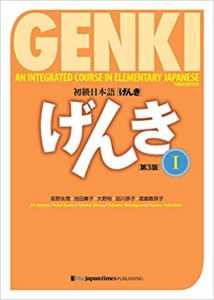
Published by the Japan Times, the Genki series is currently in its 3rd edition print run (2020 edition) and has sold more than 2 million copies worldwide.
There are no shortcuts with this textbook — you have to put in the time to learn and absorb the material. If you can work through to the end of this textbook, you’ll the necessary foundations of vocabulary, grammar, hiragana, katakana, and some basic kanji to build on.
The book is divided into 2 sections:
Conversation / Grammar focuses on learning vocabulary, sentence structure and culturally useful expressions via studying dialogues.
Reading / Writing focuses on teaching you kanji and reading comprehension via lessons that correspond to the Conversation part of the book.
Overall, while the Genki series still has some flaws that other textbooks have (for example, it teaches ‘Sayonara’ for ‘goodbye’, which isn’t very commonly used day-to-day in Japan), it’s still the best book out there to start learning Japanese on your own.
Pros:
- Accompanying CD for practicing pronunciation
- Lots of exercises to practice at the end of each chapter
- If you finish this textbook, you’ll have a fairly large vocabulary (about 50 words per chapter)
Cons:
- Unusual standard of romanization: ie. kiree instead of kirei
- Doesn’t include the stroke order for kanji
- Sometimes not 100% logical in its presentation (ie. teaching 5 color words, but then skipping the rest)
Notes:
- If you get Genki, we also recommend you get the workbook too.
2. A Dictionary of Basic Japanese Grammar
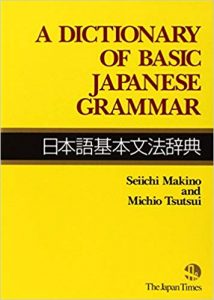
Pros:
- Comprehensive and thorough
- Grammar points are explained clearly and with helpful examples
- Learn the difference between similar and often confused grammar points
Cons:
- This book is not a textbook — think of it as a dictionary of grammar (as the title says)
3. Remembering the Kana: A Guide to Reading and Writing the Japanese Syllabaries in 3 Hours Each

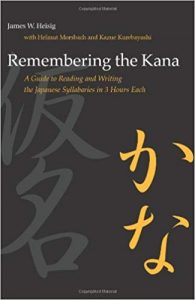
Pros:
- Mnemonics that really help to remember each character
- Can teach you how to recognize hiragana and katakana in 3 hours each
Notes:
- If you already know kana, skip this one and jump ahead to Heisig’s Remembering the Kanji book
- If you’ve learned some kana without much difficulty, you may find this book ‘overcomplicates’ the learning
4. Kodansha’s Furigana Japanese Dictionary
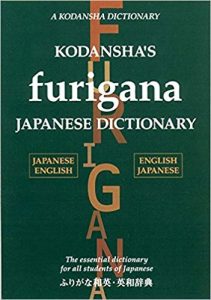
Pros:
- Great section on how to conjugate regular and irregular Japanese verbs
- Example sentences to show how words are often used
Cons:
- If anything, it’s not big enough for some more intermediate or advanced users
- No information on intonation
Notes:
- Organized alphabetically by kana, not the roman alphabet
- No romaji, all furigana
5. Remembering the Kanji, Volume 1: A Complete Course on How Not to Forget the Meaning and Writing of Japanese Characters
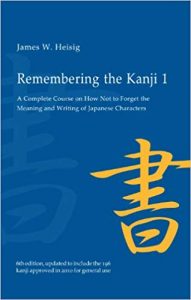
My personal anecdote about this book: I struggled terribly with remembering Kanji before I came across this book years ago, and it helped me immensely. Although I’ve forgotten many of the mnemonic ‘stories’ I first learned, I still remember the meanings of most kanji.
Pros:
- Learn the ‘parts’ that make up a kanji
- Teaches you how to remember the meanings of hundreds of characters
Cons:
- Some of the keywords chosen in the book are ambiguous or strange (ie. rarely-used English words instead of its regular-use equivalent)
- You’ll only learn the basic ‘meaning’ of the kanji, so without further study you won’t be able to ‘read’ Japanese kanji or compound words
Notes:
- Some people report not being able to view kanji stroke order on the kindle version. Buyer beware!
- Most people pair this book with Anki flashcard software. I did this and 100% recommend it
6. Kanji in Context
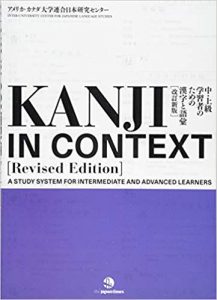
Pros:
- Over 150 lessons that teach kanji within the context of writings
Cons:
- Might be hard to find or expensive outside of Japan
Notes
- Not for beginners — more intermediate to advanced
7. The Kodansha Kanji Learner’s Dictionary
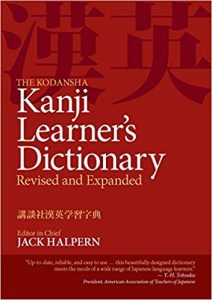
Pros:
- A visually appealing, well layed-out dictionary
- The ‘SKIP’ method used to look up kanji is quite ingenious
- Up to date, reliable definitions and examples
Notes
- Some people find the lookup method unintuitive (however I think this is rare)
8. JLPT Study Guide: The Comprehensive Guide to the JLPT Level N5 Exam
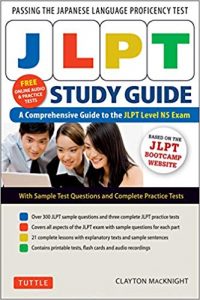
If you’re just starting to learn Japanese, and are aiming to take the N5 test (or even if you’re in need of a refresher), I highly recommend this book. It has an easy to follow layout, great illustrations, and covers each topic at a good pace.
One of the best ways to prepare for the JLPT test is doing actual practice questions, which this book has plenty of. The practice sections include all the different types of questions that you’ll see on the actual test (kanji, grammar, reading and listening), so you’ll know which areas you’re prepared for, and which need more work.
If you’re working towards N5, this is the book for you!
Pros:
- More than 300 JLPT N5 practice questions included
- 3 printable N5 practice tests
- Accompanying audio for listening comprehension
- Printable flash cards for kana and N5 kanji
- Fun illustrations and dialogues
Notes:
- Ideal for students wanting to go from zero to N5 in a short amount of time.
9. How to Sound Intelligent in Japanese: A Vocabulary Builder
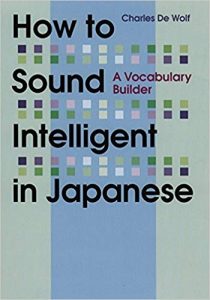
Pros:
- Good structure and categorization
- Fun learning for advanced students
Cons:
- Often vocabulary is quite specialized and difficult to use
Notes
- Recommended for N3 or above (not lower).
10. Read Real Japanese
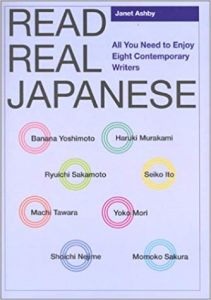
I enjoyed studying with this book except for the author’s inexplicable usage of romaji in the vocabulary explanations. Why would an advanced learner still be using romaji? Anyway, it is an interesting read and you should be able to find it used for cheap on Amazon.
Pros:
- Helpful in making the difficult jump from textbooks to reading “real” Japanese
- Great selection from contemporary writers such as:
- Seiko Ito
- Momoko Sakura
- Ryuichi Sakamoto
- Banana Yoshimoto
Cons:
- The use of romaji in a book for advanced students is a questionable and unfortunate design choice
- Lack of sentence-by-sentence translation
11. Read Real Japanese Essays: Contemporary Writings by Popular Authors
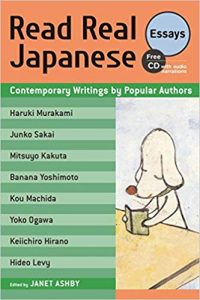
Pros:
- Notes that explain cultural contexts and usage
- Narrated CD comes with the book
- Interesting contemporary essays from popular authors including:
- Murakami Haruki
- Yoshimoto Banana
- Hirano Keiichiro
Notes:
- For intermediate students (if you’ve finished the Genki series, you could try this out)
12. Read Real Japanese Fiction
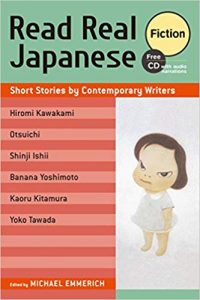
Pros:
- Excellent selection of stories from well-known, established authors:
- Kawakami Hiromi
- Otsuichi
- Ishii Shinji
- Yoshimoto Banana
- Kitamura Kaoru
- Tawada Yoko
- Helpful notes in the back of the book
- Narrated CD comes with the book
Cons:
- Doesn’t include complete translations of all sentences
- Furigana next to every new kanji (could be a plus, depending on your level)
- Not organized by level of difficulty (the first story is harder than the second for example)
Honorable Mentions That Didn’t Quite Make the List
Nihongo Through Newspaper Articles
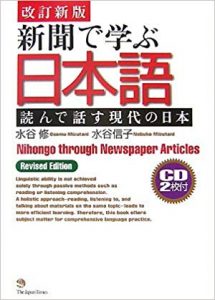
A solid offering from the Japan Times for building up your Japanese vocabulary. Each lesson presents a new article with vocabulary and exercises. There’s also two audio CDs included. A lesson a day will quickly improve your reading comprehension.
Pros:
- Comes with 2 CDs
- Great for building vocabulary to eventually read the newspaper
Cons:
- Difficult to find outside of Japan — it’s available to buy, but can be quite expensive! Recommended you search second hand.
Notes:
- For intermediate to advanced
Pimsleur Japanese
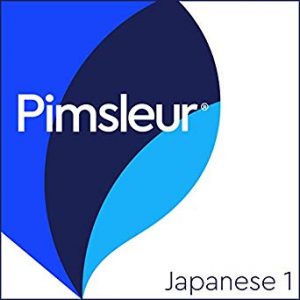
Not strictly a book, but it’s a great audio course for starting out in Japanese. Gets a bit too corporate for my liking towards the end of the 3rd series, but you will remember and be able to use what you learn with Pimsleur. You can sample Pimsleur Japanese for free with a Audible 30 day trial. Download the taster course here.
Notes
- A lot of people hate on Pimsleur (Why???), but it’s really good for beginners to get you speaking. Try it out if you’re just starting Japanese!
Making Out in Japanese
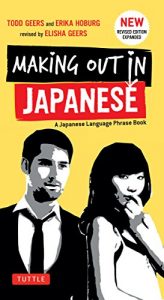
Pros:
- Fun and entertaining (and possibly useful, if you end up single in Japan!)
Cons:
- You might consider the phrases ‘too lame’ to use in real situations
Notes
- Contains language not suitable for younger readers
Kanji Study Cards

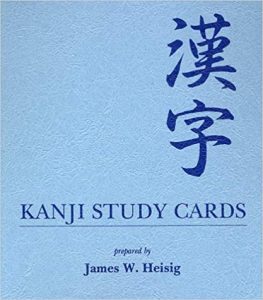
Pros:
- Very helpful if you’re using Heisig’s method for learning the kanji
Cons:
- Expensive and difficult to find (used to be $100 on Amazon, now difficult to find retail)
Notes:
- Only useful in conjunction with the Remembering the Kanji book
- Cards haven’t been laminated so you can write your own notes on the cards. The downside of this is they can become ‘boro-boro‘ quite easily
So there you have it. There are probably more (I have spent a lot of money on Japanese books over the years) but those are — in my opinion — the best books to learn Japanese. Enjoy!
Michael has lived in Japan on and off for almost 10 years. He loves studying Japanese, and is currently working on going from N2 to N1 on the JLPT.
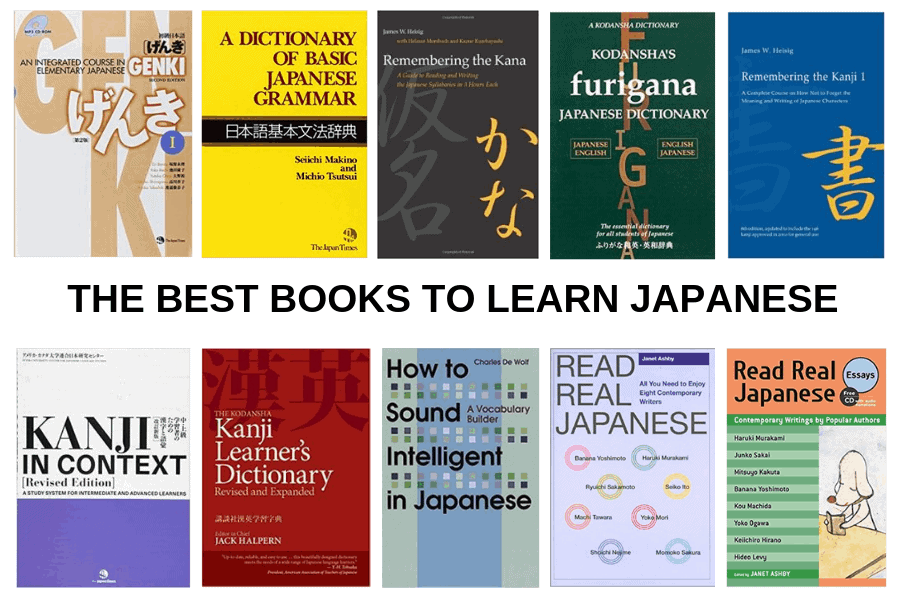

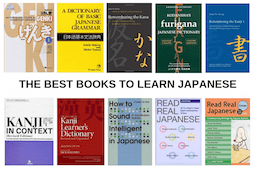
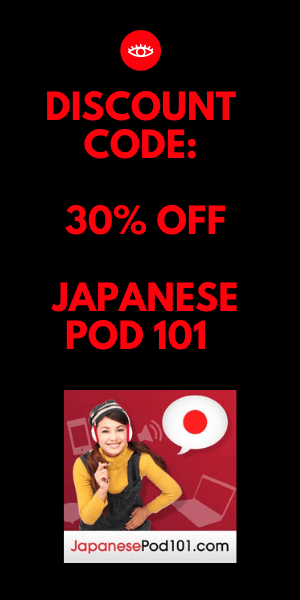
I think ‘Human Japanese’ is wonderful. Yes, I agree with you self-learning with determination is more effective. To learn good at a language is to spend time and engage in yourself in the environment, listen, speak and read whenever you can. At best is to know a friend of that country, or go there!!!
Thank you for the comment Wingman! I’ve never heard of “Human Japanese” before. What is good about it?
Human Japanese is not a book but more of an interactive tool for learning that can be downloaded to your smart phone or tablet. I not having a credit card only have access to the demo but through that I’ve easily been able to get through the first two writing systems and some basic vocabulary. It is written in an extremely interesting and accessible manner and seems to have a very everyone can learn Japanese attitude. If you have a smart phone it’s definitely has my recontamination, and when I get my credit working again I will be running straight back to it.
I think that “Basic kanji book” is also a great thing! It’s one of the best books I’ve ever seen 🙂
What about Genki? I swear it’s the best Japanese textbook ever created to go along with its workbook. I have been learning from Genki for about 2- 3 years now and I really enjoy it. It covers from basic Japanese grammar and vocab and kanji all the way up to complicated compounds and keigo. I really enjoy it and I have been learning Japanese since about 5 years ago and it is byfar the best textbook I’ve ever used for grammar and vocab. However, if a person wanted to work a lot further on their kanji and get a good grip on onyomi and kunyomi (different readings of kanji – Japanese origin readings and Chinese origin readings) I recommend the Basic Kanji book. It teaches around 500 kanji per book and has great work book pages and teaches radicals. I find it to be my number one supplimentive pick for kanji.
I was wondering if out of these books which ones do you really need? I am on a budget which books are best to start with? Thank you.
Remembering the Kanji is an amazing book, I used it way back to learn the meaning of the Jouyou in about two months, and I managed to preserve above 95% accuracy for quite some time (until I stopped with my Japanese studying). It’s really a one-of-a-kind, so different and so much more efficient than other Kanji-books I’ve tried to learn from.
I’d also suggest the Japanese For Busy People series (the kana versions), which I used to get started. If you go through all three books, you’ll have a strong foundation to build on, both in terms of grammar and vocabulary.
Hey, I have heard a lot about the Genki books and I was thinking of getting them but since there SOOOOOO expensive, I was wondering if there are any books that might be just as good but a cheaper alternative, or at least any book that would be good to get as well as Genki? please answer soon 🙂
do you know any places where you can Buy the books. Everyone says that all the books are good but I want to know where you can get them, other than amazon though.
The dictionary of basic japanese grammar is a great book. Helped me a ton in understanding it. Also japanese the manga way is a great read for anyone who gets bored reading traditional books
Thanks for commenting. We plan to review Japanese The Manga Way in the near future!
The Basic Japanese Grammar (and intermediate) book and Remembering the Kana were great resources for me as well. I also found Remembering the Kanji to be great, although even after finishing it the road to truly learning kanji is a looong one.
Please take a look at my website about Japanese NOVELS for Japanese learners if you get the chance. I would love feedback on it from another Japanese learner (and writer focusing on Japanese learners). Thanks!
Hi Andy. Thanks for commenting! Your site looks interesting. Are those books that you have had produced yourself or are you just organizing them in a logical way for learners?
Hi Frank!
Thanks for the response, and taking a look at the site. While I have hopes of eventually producing books aimed at learners of Japanese, this site is, a you put it so well, organizing Japanese novels, etc in a logical way for learners. =)
I’m learning Chinese at the moment, but I hope to learn Japanese at some point in the future. If I already am learning Hanzi is it okay to skip learning Kanji or should I still study it?
A fair few of the Handzi have changed or mean something different in Kanji so I wouldn’t recomend skipping it.Though you could probably get away with it if you really wanted.
I have to learn Spanish and A bit of Chinese for my job, so I need good books. The best book to learn Spanish in all the lists seems to be: A Good Spanish Book! (University Academic Editions), but I am totally lost for Chinese… there are no rankings… any suggestions?
I think that “Basic kanji book” is also a great thing! It’s one of the best books I’ve ever seen
I was watching Youtuber Yuta Aoki’s video about “How To Really Make a Japanese Sentence” then noticed that he implies this book having ‘unnatural language’ errors; the Genki one. I think it does make sense what he was saying; what do you guys think?